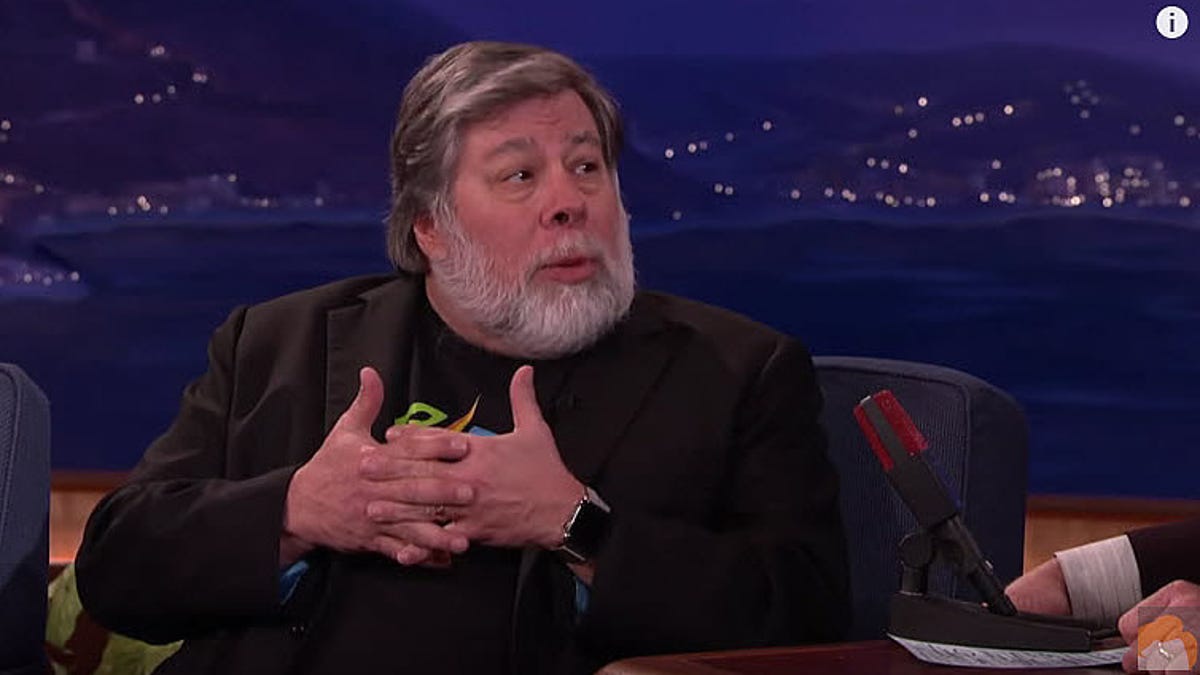Steve Wozniak sides with Apple in 'lame' FBI iPhone case
He opines to Conan O'Brien that the FBI "picked the lamest case they ever could." Woz doubts the government would find anything on the iPhone that Apple has been told to unlock.

Apple co-founder Steve Wozniak is on Apple's side in the company's battle with the FBI over iPhone encryption.
Apple co-founder Steve Wozniak is backing the company he helped create in its skirmish with the FBI.
"I side with Apple on this one," he said in an appearance on Conan O'Brien's late-night talk show on Monday. Citing the importance of computer security, he pointed to the dangers of governments telling companies to make their products insecure.
Beyond that, Wozniak said, the FBI picked "the lamest case they ever could," citing, among other factors, the lack of a court conviction in the terrorism incident.
Apple is fighting a legal battle with the US government over the issue of iPhone encryption. The FBI has demanded that the company unlock an iPhone 5C tied to one of the two shooters in the San Bernardino, California, massacre in December. The agency believes the phone's contents are important to the investigation. Apple has so far refused, arguing that it would need to create an entirely new custom version of its iOS software, building a backdoor that would put all iPhones in jeopardy.
The case has stirred controversy over the balance between individual privacy and national security. Apple and others argue that encryption, which scrambles data so it can be read only by someone with authorized access, is crucial to protect private information and communications. The FBI and law enforcement officials say the technology obstructs their ability to investigate and prevent criminal and terrorist activity.
Some who have taken Apple's side see this as a privacy issue; others have argued that it's unlikely the feds would find anything on the phone in question. In his interview with O'Brien, Wozniak noted his early efforts on behalf of the Electronic Frontier Foundation (EFF), an organization that seeks to protect the privacy of technology users. But he also said he didn't think the phone would contain any useful data.
"Verizon turned over all the phone records and SMS messages," Wozniak said. "So they want to take this other phone that the two didn't destroy, which was a work phone. It's so lame and worthless to expect there's something on it and to get Apple to expose it."
Referring to the custom version of the iOS software that the FBI wants Apple to develop to unlock the shooter's phone, Wozniak said that once you create such a thing, there's a good chance hackers can make use of it. He also speculated that countries beyond the US might request a backdoor for their own purposes.
That's not without precedent. Half a decade ago, the maker of the BlackBerry phones clashed with India and other nations over their demands that it build backdoors into its secure e-mail and instant messaging services. India had argued that the tight encryption built into BlackBerry's customer networks was an obstacle in its fight against criminals and terrorists.
The company largely finagled its way out of those situations, but the demands on it have continued. The same could apply to Apple.
"What if China says: 'Apple, you've got to give us a backdoor so we can get into any phone, even your government officials, and inspect them any time.' That's wrong," Wozniak said.

